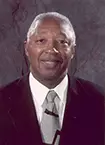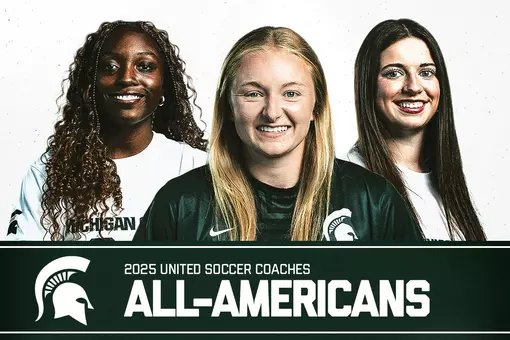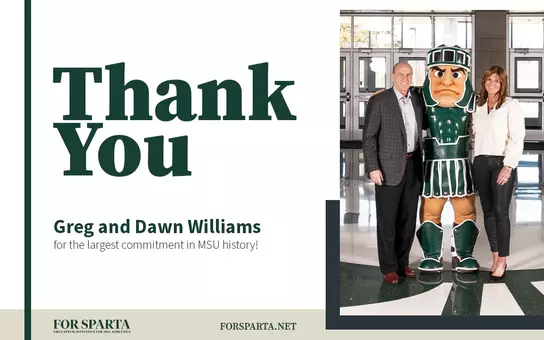Hall of Fame

Dr. Clarence Underwood
- Induction:
- 2017
- Class:
- 2002
Dr. Clarence Underwood
Administration (1969, 1972-83, 1990-2002)
Gadsden, Alabama
MSU Athletics Hall of Fame Class of 2017
HIGHLIGHTS:
• Served as athletics director from 1999-2002, which proved to be a successful three years for the department, including the 2000 NCAA Championship and multiple Final Fours for men's basketball, a 2000 Citrus Bowl victory and Top 10 finish for football, a Frozen Four for hockey and a majority of teams being represented in the NCAA Championships
• Implemented greatly expanded academic support services, including a tutoring program for all athletes with full-time academic counselors in the early 1970s
• Started Michigan State's first formal compliance program in the early 1990s
HALL OF FAME FEATURE: CLASS OF 2017
Jan. 1, 1954, was a great day in the history of Michigan State football and Spartan athletics. On that day, the Spartans defeated UCLA, 28-20, in their first ever trip to the Rose Bowl. It was also a day that changed the life of Clarence Underwood, exposing him to Michigan State, a place where he would later serve as an educator, administrator, and most importantly a mentor to so many student-athletes.
Stationed at Fort Bragg, North Carolina, Underwood, serving in the United States Army 82nd Airborne Division, was on a break from guard duty when he happened upon a live broadcast of the Rose Bowl.
"I had never seen black and white boys playing together on the same team," said Underwood, who grew up in Gadsden, Alabama. "I couldn't believe the number of black athletes playing key roles for Michigan State - players such as LeRoy Bolden and James Hinesly.
"At that time I told myself 'man, when I leave here I'm going to Michigan State.'"
Underwood made good on the promise to himself, and in 1961 he received his bachelor's of science degree in physical education at Michigan State. His career in education began as a physical education teacher for elementary and junior high schools in the East Lansing school district, while simultaneously pursuing a master's degree in physical education and counseling from MSU, which he completed in 1965.
From there, Underwood moved on to jobs at Northern Michigan University, the University of Wisconsin and the Michigan Department of Education, not knowing that his career path would bring him right back to Michigan State.
There was a brief stint as assistant ticket manager, but his career in athletics administration really began when he was named assistant athletics director for academic support in 1972. His primary responsibility was the implementation of greatly expanded academic support services, including a tutoring program for all athletes with full-time academic counselors. In 1978, Underwood was recognized for his work in academics by being elected president of the National Academic Athletic Association.
"Everything I did at Michigan State, I loved," Underwood said. "In everything I did, my goal was to make it better when I left than when I came in. I wanted to impact the student-athletes to do their best. My highest goal always was to help student-athletes graduate and demonstrate good conduct with the same intensity as coaches prepared them to win in their sports."
After 11 years at Michigan State, during which time he worked to earn a Ph.D. in administration and higher education in 1982, Underwood became a deputy commissioner at the Big Ten Conference in 1983. At the Big Ten, Underwood served as the liaison with each school's director of athletics, was the primary administrator for the men's sports coaches and oversaw the officials, team physicians and athletic trainers. Furthermore, he initiated the popular Big Ten SCORE program (Success Comes Out of Reading Everyday) for inner city children, promoted the Big Ten Advisory Commission to give voice to minority/equity issues and established lofty standards in the area of academic advising and institutional compliance.
But once again, Underwood found his way home to MSU when Athletics Director George Perles hired Underwood to be the school's assistant athletic director in charge of compliance in 1990 and implemented the school's first formal compliance program. Four years later, he was appointed senior associate athletics director where he served as the departmental point person on all student-athlete welfare issues, while also developing cultural programs for student-athletes.
In April 1999, Underwood assumed leadership of the department, starting a three-year stint as Athletic Director. The 1999-2000 season proved to be one of the best years ever for Spartan athletics, including an NCAA Championship for men's basketball, a New Year's Day Citrus Bowl victory for football and a CCHA Tournament title for ice hockey. Fifteen of MSU's 26 sports were represented at their respective NCAA Championship. The 2000-01 campaign brought similar success, highlighted by a Final Four appearance for the men's basketball team and a Frozen Four trip for the ice hockey squad. In 2001-02, Michigan State hosted "The Cold War," an outdoor hockey game at Spartan Stadium between MSU and Michigan, played in front of a world record crowd of 74,554 (Oct. 6, 2001).
During his time as athletics director, Underwood reflected on what brought him joy in his job.
"I get a great deal of satisfaction in seeing young people come to our program and develop as individuals while having an opportunity to play their sport, get an education, earn their degree and then come back here someday and say 'thank you,'" Underwood said. "Michigan State has a rich tradition, including a history of offering many opportunities to all minorities. It is that history and the current student-athletes that make me proud to be a Spartan."
For Underwood, his life's work has been about helping others. Because of his efforts, many student-athletes of all races have gone on to experience great success in life beyond their athletic careers. It's an impact that even he is only starting to grasp.
"My job was to support the coaches and serve them the best I could, and build strong relationships with the athletes to help them be successful," said Underwood. "I never really thought of their success being a tribute to me - that wasn't the reason I did what I did. But looking back on everything now, I can see that my support helped others accomplish so many great things."
Perhaps that humble mindset is why Dr. Clarence Underwood was surprised to receive the call from MSU Athletics Director Mark Hollis informing him of his induction into the Hall of Fame.
"Nothing stuns me at my age, but I was stunned when Mark Hollis called me," said Underwood. "It's an amazing honor, but I never worked for individual recognition or honors. I'm elated and just starting to wrap my mind around it."
For someone who learned about Michigan State after happening upon a game on television, it's been a remarkable journey. And considering the number of Spartan lives Underwood has mentored, it's even more amazing.
Administration (1969, 1972-83, 1990-2002)
Gadsden, Alabama
MSU Athletics Hall of Fame Class of 2017
HIGHLIGHTS:
• Served as athletics director from 1999-2002, which proved to be a successful three years for the department, including the 2000 NCAA Championship and multiple Final Fours for men's basketball, a 2000 Citrus Bowl victory and Top 10 finish for football, a Frozen Four for hockey and a majority of teams being represented in the NCAA Championships
• Implemented greatly expanded academic support services, including a tutoring program for all athletes with full-time academic counselors in the early 1970s
• Started Michigan State's first formal compliance program in the early 1990s
HALL OF FAME FEATURE: CLASS OF 2017
Jan. 1, 1954, was a great day in the history of Michigan State football and Spartan athletics. On that day, the Spartans defeated UCLA, 28-20, in their first ever trip to the Rose Bowl. It was also a day that changed the life of Clarence Underwood, exposing him to Michigan State, a place where he would later serve as an educator, administrator, and most importantly a mentor to so many student-athletes.
Stationed at Fort Bragg, North Carolina, Underwood, serving in the United States Army 82nd Airborne Division, was on a break from guard duty when he happened upon a live broadcast of the Rose Bowl.
"I had never seen black and white boys playing together on the same team," said Underwood, who grew up in Gadsden, Alabama. "I couldn't believe the number of black athletes playing key roles for Michigan State - players such as LeRoy Bolden and James Hinesly.
"At that time I told myself 'man, when I leave here I'm going to Michigan State.'"
Underwood made good on the promise to himself, and in 1961 he received his bachelor's of science degree in physical education at Michigan State. His career in education began as a physical education teacher for elementary and junior high schools in the East Lansing school district, while simultaneously pursuing a master's degree in physical education and counseling from MSU, which he completed in 1965.
From there, Underwood moved on to jobs at Northern Michigan University, the University of Wisconsin and the Michigan Department of Education, not knowing that his career path would bring him right back to Michigan State.
There was a brief stint as assistant ticket manager, but his career in athletics administration really began when he was named assistant athletics director for academic support in 1972. His primary responsibility was the implementation of greatly expanded academic support services, including a tutoring program for all athletes with full-time academic counselors. In 1978, Underwood was recognized for his work in academics by being elected president of the National Academic Athletic Association.
"Everything I did at Michigan State, I loved," Underwood said. "In everything I did, my goal was to make it better when I left than when I came in. I wanted to impact the student-athletes to do their best. My highest goal always was to help student-athletes graduate and demonstrate good conduct with the same intensity as coaches prepared them to win in their sports."
After 11 years at Michigan State, during which time he worked to earn a Ph.D. in administration and higher education in 1982, Underwood became a deputy commissioner at the Big Ten Conference in 1983. At the Big Ten, Underwood served as the liaison with each school's director of athletics, was the primary administrator for the men's sports coaches and oversaw the officials, team physicians and athletic trainers. Furthermore, he initiated the popular Big Ten SCORE program (Success Comes Out of Reading Everyday) for inner city children, promoted the Big Ten Advisory Commission to give voice to minority/equity issues and established lofty standards in the area of academic advising and institutional compliance.
But once again, Underwood found his way home to MSU when Athletics Director George Perles hired Underwood to be the school's assistant athletic director in charge of compliance in 1990 and implemented the school's first formal compliance program. Four years later, he was appointed senior associate athletics director where he served as the departmental point person on all student-athlete welfare issues, while also developing cultural programs for student-athletes.
In April 1999, Underwood assumed leadership of the department, starting a three-year stint as Athletic Director. The 1999-2000 season proved to be one of the best years ever for Spartan athletics, including an NCAA Championship for men's basketball, a New Year's Day Citrus Bowl victory for football and a CCHA Tournament title for ice hockey. Fifteen of MSU's 26 sports were represented at their respective NCAA Championship. The 2000-01 campaign brought similar success, highlighted by a Final Four appearance for the men's basketball team and a Frozen Four trip for the ice hockey squad. In 2001-02, Michigan State hosted "The Cold War," an outdoor hockey game at Spartan Stadium between MSU and Michigan, played in front of a world record crowd of 74,554 (Oct. 6, 2001).
During his time as athletics director, Underwood reflected on what brought him joy in his job.
"I get a great deal of satisfaction in seeing young people come to our program and develop as individuals while having an opportunity to play their sport, get an education, earn their degree and then come back here someday and say 'thank you,'" Underwood said. "Michigan State has a rich tradition, including a history of offering many opportunities to all minorities. It is that history and the current student-athletes that make me proud to be a Spartan."
For Underwood, his life's work has been about helping others. Because of his efforts, many student-athletes of all races have gone on to experience great success in life beyond their athletic careers. It's an impact that even he is only starting to grasp.
"My job was to support the coaches and serve them the best I could, and build strong relationships with the athletes to help them be successful," said Underwood. "I never really thought of their success being a tribute to me - that wasn't the reason I did what I did. But looking back on everything now, I can see that my support helped others accomplish so many great things."
Perhaps that humble mindset is why Dr. Clarence Underwood was surprised to receive the call from MSU Athletics Director Mark Hollis informing him of his induction into the Hall of Fame.
"Nothing stuns me at my age, but I was stunned when Mark Hollis called me," said Underwood. "It's an amazing honor, but I never worked for individual recognition or honors. I'm elated and just starting to wrap my mind around it."
For someone who learned about Michigan State after happening upon a game on television, it's been a remarkable journey. And considering the number of Spartan lives Underwood has mentored, it's even more amazing.
MSU Athletics Press Conference Dec 5th 2025
Friday, December 05
A New Era | Pat Fitzgerald's First Day in East Lansing
Wednesday, December 03
Tom Izzo Post Game Comments | Iowa | Dec. 2 2025
Tuesday, December 02
Pat Fitzgerald | Football Press Conference | Dec. 2nd, 2025
Tuesday, December 02




